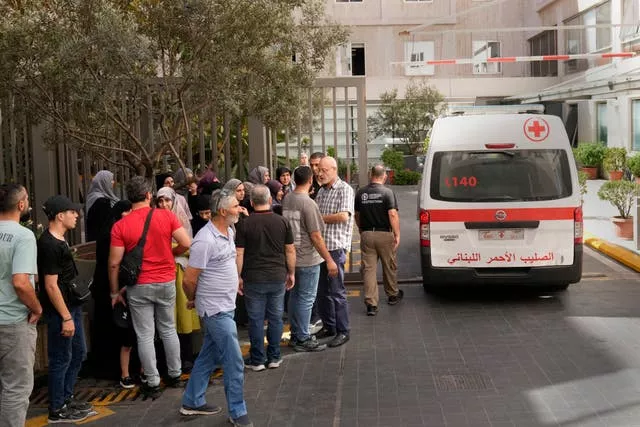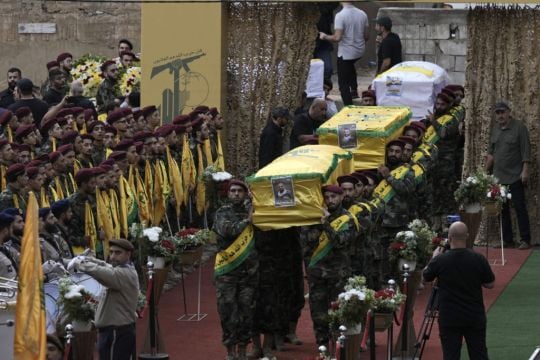Explosions went off in Beirut and multiple parts of Lebanon in an apparent second wave of detonations of electronic devices, Hezbollah officials and state media said on Wednesday, reporting that walkie-talkies and even solar equipment being targeted a day after hundreds of pagers blew up.
At least nine people were killed and 300 were wounded, the health ministry said.
Several blasts were heard at the funeral in Beirut for three Hezbollah members and a child killed by exploding pagers the day before, according to Associated Press journalists at the scene.
In the wake of the explosions, Israel’s defence minister declared the start of a “new phase” of the war as Israel turns its focus toward the northern front against Hezbollah militants in Lebanon.

Speaking to Israeli troops on Wednesday, Yoav Gallant made no mention of the mysterious explosions of electronic devices in Lebanon in recent days. But he praised the work of Israel’s army and security agencies, saying “the results are very impressive”.
He said that after months of war against Hamas militants in Gaza, “the centre of gravity is shifting to the north by diverting resources and forces”.
“We are at the start of a new phase in the war – it requires courage, determination and perseverance,” he said.
An AP photographer in the southern coastal city of Sidon saw a car and a mobile phone shop damaged after devices exploded inside of them.

A Hezbollah official told the AP that walkie-talkies used by the group exploded. The official spoke on condition of anonymity because he was not authorised to speak to the media.
Lebanon’s official news agency reported that solar energy systems exploded in homes in several areas of Beirut and in southern Lebanon, wounding at least one girl.
The new blasts hit a country still thrown into confusion and anger after Tuesday’s pager bombings, which appeared to be a complex Israeli attack targeting Hezbollah members that caused civilian casualties, too.
At least 12 people were killed, including two children, and about 2,800 people wounded as hundreds of pagers used by Hezbollah members began detonating wherever they happened to be: in homes, cars, at grocery stores and in cafes.

In the first wave of bombings, it appeared that small amounts of explosives had been hidden in the thousands of pagers delivered to Hezbollah and remotely detonated.
The reports of further electronic devices exploding suggested even greater infiltration of boobytraps into Lebanon’s supply chain.
It also deepens concerns over the attacks in which hundreds of blasts went off in public areas, often with many bystanders, with no certainty of who was holding the rigged devices.
New details on the operation began to emerge. The pagers were made by a company based in Hungary, another firm said on Wednesday.
An American official said Israel briefed the United States after the attack, in which small amounts of explosive had been hidden in the pagers.
The person spoke on the condition of anonymity because they were not authorised to discuss the information publicly.
The attack, which Israel has not commented on, renewed fears that the simmering conflict between Israel and Hezbollah could escalate into all-out war.
Secretary of state Antony Blinken said on Wednesday the US is still assessing how the attack could affect efforts to negotiate a cease-fire in the Israel-Hamas war in Gaza.
Israel began moving more troops to its border with Lebanon on Wednesday as a precautionary measure, according to an official with knowledge of the movements who spoke on condition of anonymity because he was not authorised to speak to the media.
Hezbollah and Israeli forces have exchanged fire almost daily since October 8, the day after a deadly Hamas-led assault in southern Israel triggered the war.
Since then, hundreds have been killed in the strikes in Lebanon and dozens in Israel, while tens of thousands on each side of the border have been displaced. Hamas and Hezbollah are allies and both are supported by Iran.
Israeli leaders have issued a series of warnings in recent weeks that they might increase operations against Hezbollah in Lebanon, saying they must put a stop to the exchanges to allow people to return to homes near the border.
The AR-924 pagers used in Tuesday’s attack were manufactured by BAC Consulting KFT, which is based in the Hungarian capital of Budapest, according to a statement released by Gold Apollo, a Taiwanese firm that authorised the use of its brand on the pagers.
Gold Apollo’s chair, Hsu Ching-kuang, told journalists on Wednesday the firm has had a licensing agreement with BAC for the past three years.
The attack in Lebanon started on Tuesday afternoon, when pagers in their owners’ hands or pockets started heating up and then exploding — leaving blood-splattered scenes and panicking bystanders.
It appeared that most of those hit were members or linked to members of Hezbollah – whether fighters or civilians – but it was not immediately clear if people with no ties to Hezbollah were also hit.
The Health Ministry said health care workers and two children were among those killed.
Lebanon health minister Firas Abiad told journalists during a tour of hospitals on Wednesday morning that many of the wounded had severe injuries to the eyes, and others had limbs amputated.
Journalists were not allowed to enter hospital rooms or film patients.







